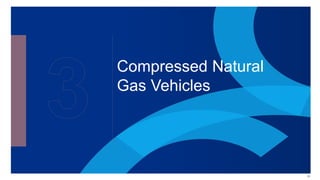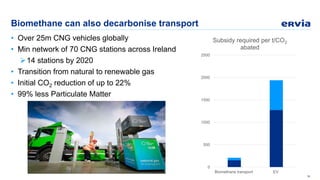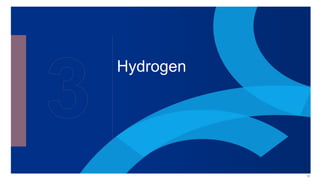Decarbonising the gas network
- 1. Decarbonising the gas network: getting to zero carbon emissions by 2050 Brendan Murphy
- 2. Ervia is a company of size and scale 1,700 employees We operate gas and water infrastructure and services 24/7 365 days a year 1.7m customers
- 3. Our Purpose To enhance the health and quality of life of the people of Ireland, protect our environment and enable economic development
- 4. Ireland’s Energy Mix Oil 57% Coal 2% Peat 1% Natural Gas 16% Electricity 19% Renewables 4% Wastes 1% Total Final Consumption Oil Coal Peat Natural Gas Electricity Renewables Wastes 4 • Ireland’s dependency on oil must change if we are to meet climate targets. • Natural gas meets 16% of final consumption and generates over 50% of the electricity. • Gas network can be decarbonised and can replace fossil fuels in electricity generation, home heating and transport.
- 5. 2050 – A Zero Carbon Emissions Gas Network 5 -10.0 0.0 10.0 20.0 30.0 40.0 50.0 60.0 70.0 2018 2020 2022 2024 2026 2028 2030 2032 2034 2036 2038 2040 2042 2044 2046 2048 2050 Demand(TWh) Hydrogen Total Biomethane Total Natural gas (CCS) Total Natural gas unabated Total
- 7. Gas is critical to Ireland’s electricity system 7
- 8. Decarbonising Electricity Generation – Ireland needs CCS 8 June 2018 – Power Generation by Fuel Type No other technology visible today to provide long-term, low-carbon peak supply - securely No credible alternatives to Gas+CCS – AT SCALE Nuclear - Not legally allowed Hydro - Lack of resource Biomass - Unsustainable Batteries - Scale unachievable Electrical I/C - Inadequate & unreliable Long periods with very little wind
- 9. Experts agree on need for CCS The UK Government should not plan to meet the 2050 target without CCS To stay ‘well below 2 degrees’ CCS would provide 32% of global emission reductions Limiting global warming to 1.5 degrees will require ‘the use of negative emissions technology’ Bio Energy CCS will be critical
- 10. And CCS continues to develop 18 Large scale CCS facilities operating globally as of 2018. MT of CO2 has been captured since 1972. 23 MT in Norway. 230+ 40 Million tonnes of CO2 can be captured annually 6,500 KM of CO2 pipelines operating safely 2025 The United Kingdom created joint industry/gov working group to develop CCS by mid 2020s
- 11. Carbon Capture & Storage • CCS - carbon neutral power for Ireland • Could capture & store 2.5 million tonnes of CO2 pa. • Potential for export of CO2 • CCS needs to be supported, similar to wind energy.
- 12. 12 Biomethane
- 13. Biomethane: Ireland has a significant opportunity 13 • Highest resource potential in the European Union • Offers opportunity for farmers to diversify • Enhances Ireland’s Security of Supply • Needs to be supported *Optimal use of biogas from waste streams: An assessment of the potential of biogas from digestion in the EU beyond 2020 (European Commission Report, 2016)
- 14. Utilising biomethane to decarbonise home heating 14 Least cost and least disruption to the homeowners Avoids expenditure on ‘deep’ retrofits of over €50bn Supports Ireland’s indigenous renewable gas sector Increased utilisation of an existing state asset worth over €2.6bn Decarbonising homes utilising biomethane offers:
- 16. • Over 25m CNG vehicles globally • Min network of 70 CNG stations across Ireland 14 stations by 2020 • Transition from natural to renewable gas • Initial CO2 reduction of up to 22% • 99% less Particulate Matter Biomethane can also decarbonise transport 16 0 500 1000 1500 2000 2500 Biomethane transport EV Subsidy required per t/CO2 abated
- 17. 17 Hydrogen
- 18. Hydrogen will also play a key role – UK leading the way 18 • Converting North of England (3.7m connections) to a hydrogen network. Potential to decarbonise 70% of homes by 2050 in UK. • Converting industrial demand in Liverpool & Manchester to hydrogen including a residential blend • Hydrogen blend trial on a private network
- 19. 19 Key Messages • The Irish Gas Network can be carbon neutral by 2050 with the right supports for CCS, Biomethane and Hydrogen • The consumer needs to be at the heart of the transition. Least cost and least disruptive technologies will be favoured by consumers. • To achieve decarbonisation Ireland will need to utilise all its assets. Electricity and gas networks will be critical.


















